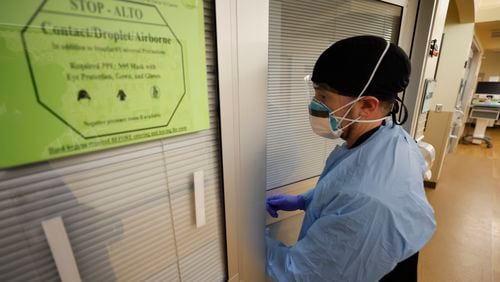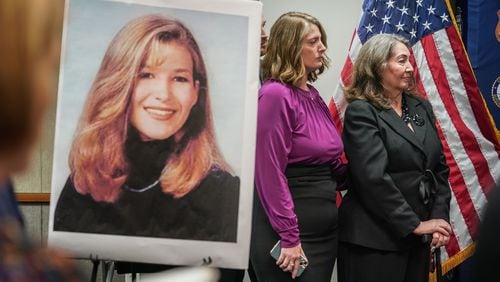Editor’s note: This story has been updated to reflect the Georgia Legislature’s approval of the “Safer Hospitals Act” in 2023 to ensure better protection for health care workers.
A nationwide shortage of nurses is being felt in Georgia, where advocates are pressing lawmakers to make the profession safer and more financially rewarding.
“Yes, there is a nursing shortage and it is critical,” Whitney A. Nash, Dean, Waters College of Health Professions & Professor of Nursing Georgia Southern University, told The Atlanta Journal-Constitution. “It is impacting both urban and rural areas.”
Georgia has 21% fewer registered nurses than it needs, according to the federal Health Resources Service Administration (HRSA). The problem, if not addressed, could get worse: Georgia is expected to see the second-highest estimated shortage among U.S. states by 2035 – despite an increasing population and an upcoming mass retirement of baby boomers, HRSA said.
Nash and other experts interviewed by the AJC say the profession’s downsides – long shifts, lack of protective clothing and masks during the COVID-19 pandemic – have impacted morale. Rowdy patients and a perceived lack of support from the public are pushing nurses to leave the profession entirely. Nurses are asking lawmakers for a combination of financial incentives and safety precautions.
“There was a nursing workforce shortage before the pandemic, but the pandemic made it worse,” Matt Caseman, Chief Executive Officer, Georgia Nurses Association/Georgia Nurses Foundation, told the AJC.
Georgia has 169,635 active, licensed nurses. Some 60% of working nurses in Georgia are employed by hospitals. Metro Atlanta had 28,253 nurses in 2021 compared to 9287 nurses in 2011. That’s down 12.5% percent from 32,315 nurses in 2017, according to a report by the Georgia Nursing Leadership Coalition (GNLC).
The shortage is felt most acutely in rural areas, due in part to the pay gap: registered nurses in Metro Atlanta earn an average $77,000 per year, while those in southwest Georgia earn $62,800.
Low wages and lack of recognition of credentials are being felt at Atlanta’s main hospital group, Sharon Pappas, chief nurse executive for Emory Healthcare, told the AJC. “Nurses’ salaries in Georgia are really low,” Pappas said. “Nurses were leaving Georgia because they could be paid more in other states. We certainly felt it at Emory Healthcare.” Pappas says some nurse practitioners also are leaving for other states where they don’t have to work under a delegating physician and can earn higher wages.
Nash said the pandemic “highlighted the horrific environments nurses were forced to work in.”
Irma Westmoreland, an RN in Augusta and a member of the nation’s largest union for registered nurses, National Nurses United, said those conditions are leading nurses to switch to administrative jobs.
“From our perspective, what we are seeing in Georgia isn’t a shortage,” Westmoreland told the AJC. “There are about 27,000 active licensed nurses in Georgia who are not willing to work under these conditions.”
Westmoreland says there’s a connection between too few nurses and violence. “Patients who are ill can be short-tempered when they are made to wait. The violence ranges from verbal abuse to pushing and hitting, stabbing, and more,” she said.
Pappas agreed: “People do not want to work as nurses right now due to the huge increase in workplace violence committed against healthcare employees.”
A presentation by Northeast Georgia Healthcare to the Georgia Senate last year said that 65% of bedside nurses experienced violence, 34% emotional abuse, and 66% physical or sexual abuse in 2023.
The state Legislature last year passed a new law that will increase penalties for aggravated assault and aggravated battery on emergency health workers and hospital workers. The law, known as the “Safer Hospitals Act,” also allows hospitals to hire certified officers for added security, but Caseman said he had no data on how many hospitals have hired officers. “HB 383 was a first step and we know more needs to be done,” he said.
Nurses’ groups are pressing for a national law to limit nurse-to-patient ratios, as well as a national protocol to mandate the use of N95 masks versus surgical masks to protect health care workers from pathogens that transmit through the air.
“We want the CDC to give our employers clear guidance, rather than our facilities deciding this. It’s about keeping patients and staff safe from the next pandemic,” Westmoreland said.
Georgia lawmakers are also attempting to address a rural medical coverage shortage. A plan by Gov. Brian Kemp would spend $50 million from the state’s reserves to open a medical school within the University of Georgia system. That facility, as proposed, would train doctors but not nurses. Nash said states that have sought to fund nurse training programs have had difficulties hiring faculty “because pay is not competitive.”
Still, Pappas from Emory wants to see funding for nurse residencies. “Pastoral residencies get funding from Medicare. I would love to see the federal government find a way to find funds for the accredited nursing programs that we have at Emory.”
In 2023, total federal healthcare funding to Georgia stood at $360 million of which $16.25 million was loan repayments and scholarships, according to the HRSA.
The nursing shortage also extends to nursing homes. Last year, the U.S. Department of Health and Human Services (HHS) proposed new rules requiring nursing homes to meet specific staffing levels in nursing homes, but the industry group American Health Care Association/National Center for Assisted Living (AHCA/NCAL) told the AJC in a statement that it opposes this.
Nash says she’s open to admitting foreign nurses, as foreseen in a bipartisan bill introduced in Congress. That bill is currently stalled, but would reclaim unused green cards from previous years to admit nurses from abroad.
She also wants to see more men enter the profession as a strategy to reduce abuse in hospitals.
“We are a bit more progressive today, so there’s less stigma around men in nursing,” Nash said. “When I graduated in 1987, I don’t think I had one male in my class.”
About the Author






